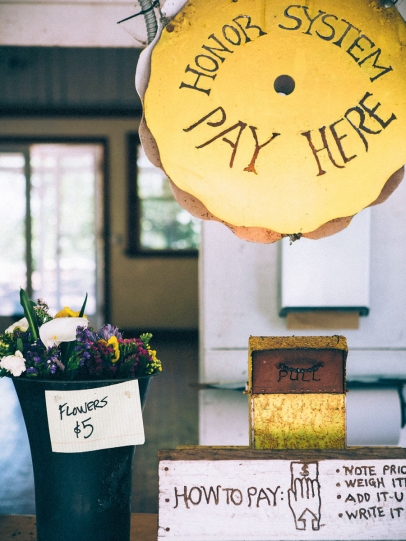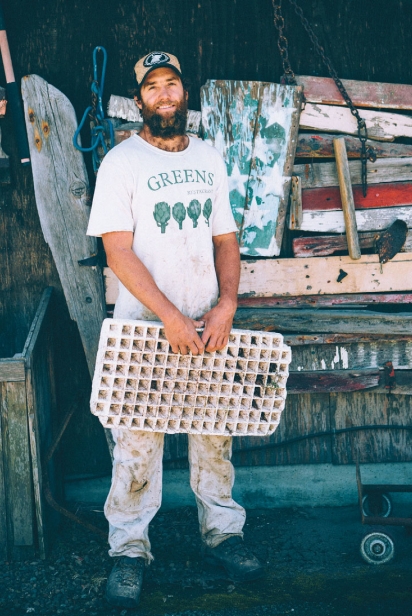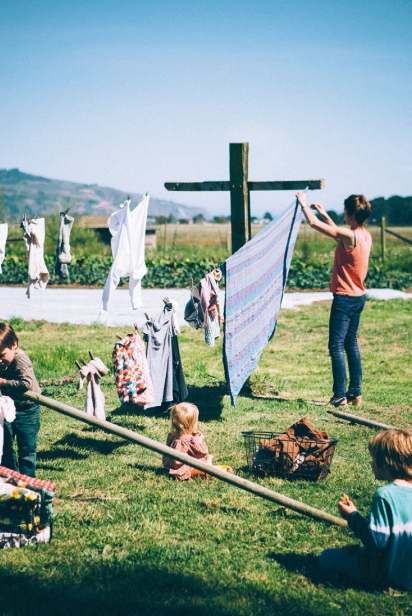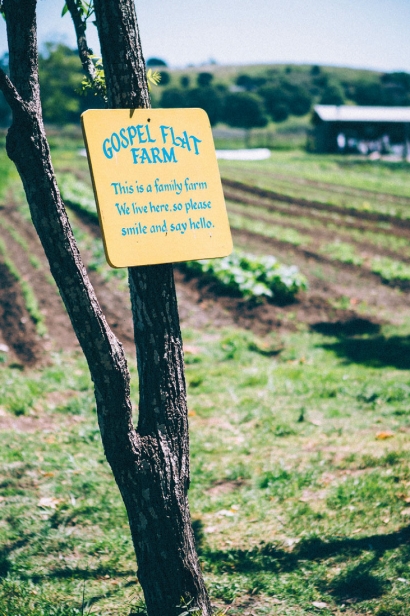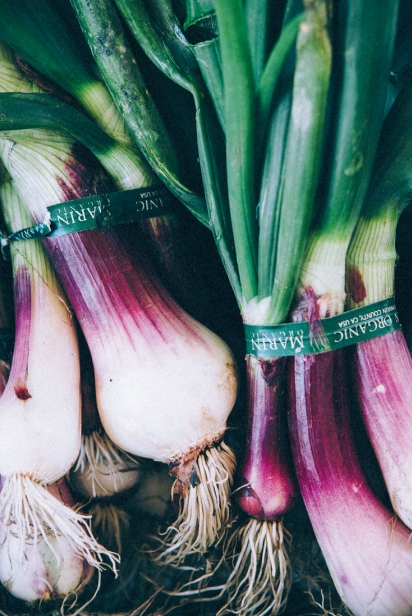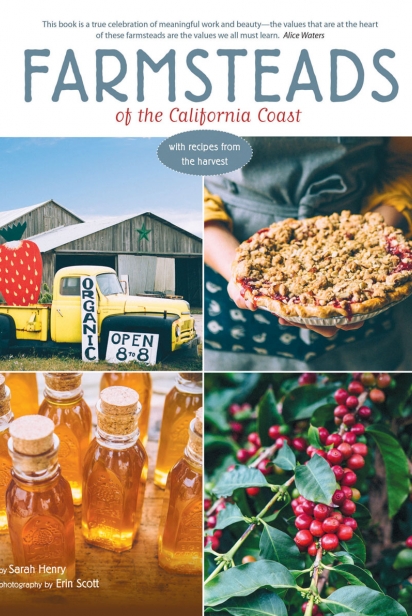Farmsteads of the California Coast
Bolinas’ Gospel Flat Farm
In the just-published Farmsteads of the California Coast (Yellow Pear Press, 2016), writer Sarah Henry and photographer Erin Scott, both frequent contributors to Edible Marin & Wine Country, offer readers an intimate look into the heart and soul of what makes this part of the world so uniquely enchanting. Just outside of international powerhouse urban centers, they find extraordinary people consciously and reverently tending the land and sea in order to bring forth unparalleled bounty. Reading their stories and seeing the gorgeous images of them at work is both balm to the spirit and reason for optimism. Henry and Scott have joined their efforts and considerable talents to pay tribute to subjects they both care deeply about, and it shows on every page.
—Edible Marin & Wine Country
For Mickey Murch, cultivating crops is a creative endeavor. Whether he’s harvesting by hand or planting seeds via tractor, art and agriculture intersect at Gospel Flat Farm in Bolinas, where growing food is a living art form, not just a way to make a living.
Take his 24-hour farmstand. Beloved by locals and visitors alike, the simple structure by the side of the road is the farm’s permanent art installation and features a rotating display of earthy sustenance. Wooden crates boast fresh picked greens, root vegetables, and herbs. Buckets hold showy flowers. Eggs fill an assortment of baskets. Crab makes an appearance, in season. “It’s a form of art to constantly interact with food,” says Murch, a second-generation farmer. “There’s a human power to produce and the farmstand is an expression of collective creative forces on the land. The people who stop by and interact with the space are a part of the art, too. It’s social sculpture functioning as an art form.”
Gospel Flat’s name is a nod to the four ‘houses of hope’ that once graced the area, located a few miles from the cliff-hugging coastal Highway 1, past a tidal estuary and beyond a grove of towering eucalyptus trees. Murch is a modern-day good news man, spreading the gospel of organic farming and community connection through his farm-fresh food in this pastoral setting in West Marin a mere 30 miles north of San Francisco.
Murch had no plan to work the land as a way of life. In 2002, when he set off for Reed College in Portland, Oregon, to study conceptual and environmental art, he never imagined he’d eventually come home to run the family farm in Bolinas. And yet his college art reflected his upbringing. Murch splashed paint on work boots and wheelbarrows. He lived rough for a year, exploring whether a student could survive on campus by growing, making, finding, recycling, or bartering basic necessities. He camped out in a handmade rolling caravan and stitched shoes from leather straps and tire treads. He preserved produce, beer, beans, cider, and salmon in Mason jars. He made an indoor exhibit that included a film documenting his experience.
Murch realized that his artistic persona was so thoroughly entwined with his farmboy background that he made his way back to the land. In Portland, he built himself a pod to live in as part of a sculpture assignment. In 2006, he brought it back with him to Bolinas so he could better commune with the natural world.
His creative pursuits with an edible bent continued. Murch fashioned a mobile kitchen out of an old boat, which he hitched onto a trailer and towed into town, bringing the farm to the people. The boat serves as a portable classroom of sorts, educating children about canning fresh food or pressing apples for cider. Local chefs have borrowed the boat for pop-up dinners with a homegrown, artsy feel.
A FAMILY AFFAIR
Farming on the edge appeals to this child of the eclectic coastal enclave affectionately known by residents as Bobo. Mickey Murch’s parents, Don Murch and Sarah Hake, moved to Gospel Flat Farm in 1980. Murch senior and the family transformed the site, blighted from a decade of trash buildup, into fields of organic greens. After graduating, Murch junior took over the day-to-day operations of managing the farm while Don, a lifelong fisherman, focused on his heavy-equipment business. The two Murch men take care of the crab pots together. Mickey’s brother Kater kicked off the family’s on-site wine production. His mom, a university plant geneticist, bakes bread in the outdoor wood-fired oven. His maternal grandmother is a painter and has her own art studio on the farm.
The 32-year-old Murch lives on the farm with wife Bronwen and their three young children. His family shares the big Victorian house on the property with his parents. Bronwen curates events at a barn Mickey built behind the farmstand, which serves as a revolving showcase for other artists’ work.
In the early days, the younger Murch made typical first-time-farmer mistakes. It took a few growing seasons to figure out what produce to grow and where, as he got to know intimately the climatic conditions of the farmland. Even something as simple as watering crops has a learning curve. “A new farmer will look at the surface soil and see that it’s dry, but a seasoned grower will kick down the soil a few inches to check for moisture,” he says.
He didn’t have any idea how to sell what he grew. He just knew he didn’t want to have to drive “over the hill” to San Francisco to sell his bounty. He tried delivering produce boxes and inviting people to the farm to pick their own, but neither felt quite right. Almost as an afterthought, he began putting excess vegetables by the side of the road. That proved the inspiration for the farmstand. The unattended stand works on the honor system; customers weigh and pay without oversight. The locked money box is emptied regularly.
Murch enjoys fielding questions from folks who stop by. A favorite: “What do you do with this?” He relishes introducing eaters to unfamiliar produce, such as a root vegetable he refers to as a snow apple. It’s actually a Japanese turnip, a crisp, white globe of surprising sweetness that can be eaten raw. And he enjoys not having to haggle with wholesalers over the price or appearance of his produce. “You can accomplish so much when you don’t have to peddle your wares,” says the farmer, who most days tends his 10 acres with the help of two employees. Murch does the bulk of the tractor work, his fellow farmers, originally from Mexico, harvest crops and stock the stand.
FARMSTAND SUCCESS
Murch’s faith in farming has paid off. The farmstand not only feeds Murch’s creative needs, it’s economically viable. He makes more money from the stand, he says, than he would selling wholesale or at farmers markets and is able to support a family of five.
The stand has been running for almost 10 years and has served as a model for similar small farms elsewhere in the Golden State.
Murch takes being a good husband to the land to heart and innovates farming in multiple ways. Beginning in 2011, he leased four acres of neighboring public land for dry-farm cultivation, a drought-friendly farming practice that requires little or no irrigation. The reclaimed area, long neglected, has become a key part of the small farm’s year-round production of produce, including arugula, beets, fava beans, tomatoes, and spinach.
While what he manifests starts with seeds in the soil, it comes to fruition at the table. “We want the food we grow to inspire people to cook and gather to eat,” he says. “When art, farming, food, care for the land, and creativity in the kitchen come together to form community, it’s a beautiful thing.” Spoken like a true artist-farmer.


